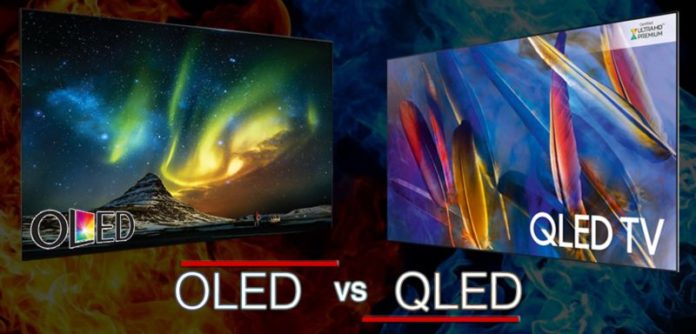In time past, buying a TV was just about the brand; Sanyo, Sony, Panasonic, Samsung, Philips, LG and others. But since the advent of flat screen TVs, the focus has moved from just brand name to the type of screen; whether it is LCD (liquid crystal display) or LED (light-emitting diode), and even further, whether it is HD (high definition) or just regular.
But in more recent times, the conversation has even moved further to whether the TV set has an OLED screen or a QLED screen, and whether it is a 4K or 8K model, plus more. Indeed, the manufacturers and marketers of TV sets don’t even brag about the brand name anymore – rather its all about features – particularly whether the set is OLED or QLED.
This write up therefore seeks to help you understand the implications of your choice in a screen type when going for a TV set, since all the brands promise similar experience based on the whether the set is OLED or QLED.
QLED and OLED represent high-end display technologies found in certain brands and models of televisions. Understanding the differences can help you choose the best one for your viewing habits.
OLED and QLED basics
Some confusion exists when considering OLED and QLED, which is understandable. Both use similar acronyms to describe the technology in use. And both represent a difference from the basic LCD technology in use in most flat screen TVs.
What is OLED?

OLED is short for organic light-emitting diode. OLED represents a significantly different type of technology than is found with flat screen LCD TVs.
With OLED technology, each dot in the panel consists of an organic pixel. These pixels create their own level of light when they receive electrical power. The OLED panel is able to turn on and turn off each individual pixel separately, which creates precise colors and brightness.
An OLED television does not require a backlight like an LCD television, because the OLED pixels are able to generate their own light. Pixels in an LCD TV do not generate light. They only generate color, which means the backlight adds the light that creates the display.
Interestingly, as of 2019, only LG was the only company producing OLED TV panels. You may see an OLED TV model from a brand other than LG, but understand that LG likely manufactured the panel, and the other brand assembled the TV around it. Earlier this year, the company opened a manufacturing plant to mass produce the panels.
What is QLED?

QLED is short for quantum dot LED (or light emitting diode). This technology signifies an improvement from the standard LCD TV technology, but it’s not as large of a shift as OLED.
With QLED technology in a TV, the manufacturer uses the standard LCD panel found in the majority of TVs. The manufacturer then adds a quantum layer to the panel, which allows the display to achieve a greater number of colors.
The LED portion of the name QLED refers to the LED backlight used behind the LCD panel, especially around the edges, which delivers a higher quality of picture than a typical backlight in an LCD TV.
Samsung primarily manufactures QLED TVs and has for several years. However, other manufacturers can — and do — make QLED TVs, as QLED is not a proprietary technology.
Comparing OLED and QLED

When comparing an OLED TV to a QLED TV, it’s important to understand the strengths and weaknesses each technology has.
4K and HD
To clear up a potential point of confusion, both OLED and QLED televisions are able to display video streams in either 4K or HD resolution. The display resolution of the TV is not dependent on the technology that’s in use in your television.
Brightness
With its use of backlights throughout the panel, including the edges, the QLED screen should have a greater level of brightness than what an OLED TV can achieve.
If you will be placing the television in a room where sunlight hits it directly, you’ll definitely notice the better level of brightness found with QLED.
Deeper black
For the best viewing quality for movies, a deeper black color on the screen is desirable. Even though it may seem like a traditional LCD TV has a pure black color, the backlight generates a little bit of light bleed, which affects the quality of black on the screen. The light bleed sometimes gives black colors a dirty, dark gray look.
Because OLED pixels generate their own light, without needing a backlight, they can create deeper, truer blacks than the QLED television.
In fact, the ability to achieve true black is perhaps the biggest advantage of an OLED TV.
Price
QLED televisions have a slightly lower price point than what you’ll find with OLED. You can expect to save between 10% and 30% with QLED.
Sharpness
OLED televisions have an ability to deliver a slightly sharper picture quality versus QLED, because the OLED panels can control each individual pixel’s level of brightness. Meanwhile, the backlight found with QLED causes a little bit of bleed around each pixel in the display, which slightly affects the level of sharpness the QLED can create.
The difference is so slight, though, you may not notice it unless you’re viewing a 4K input signal.
Final thoughts
Honestly, it’s tough to go wrong with either OLED or QLED technologies. Perhaps the best advice is to think about your budget for the new TV and select the technology that fits what you have to spend.
If you love watching movies, though, the greater image quality exists in OLED, especially in its ability to generate a true black color. Movie lovers may want to spend the extra money to gain the advantages found with OLED TVs.








